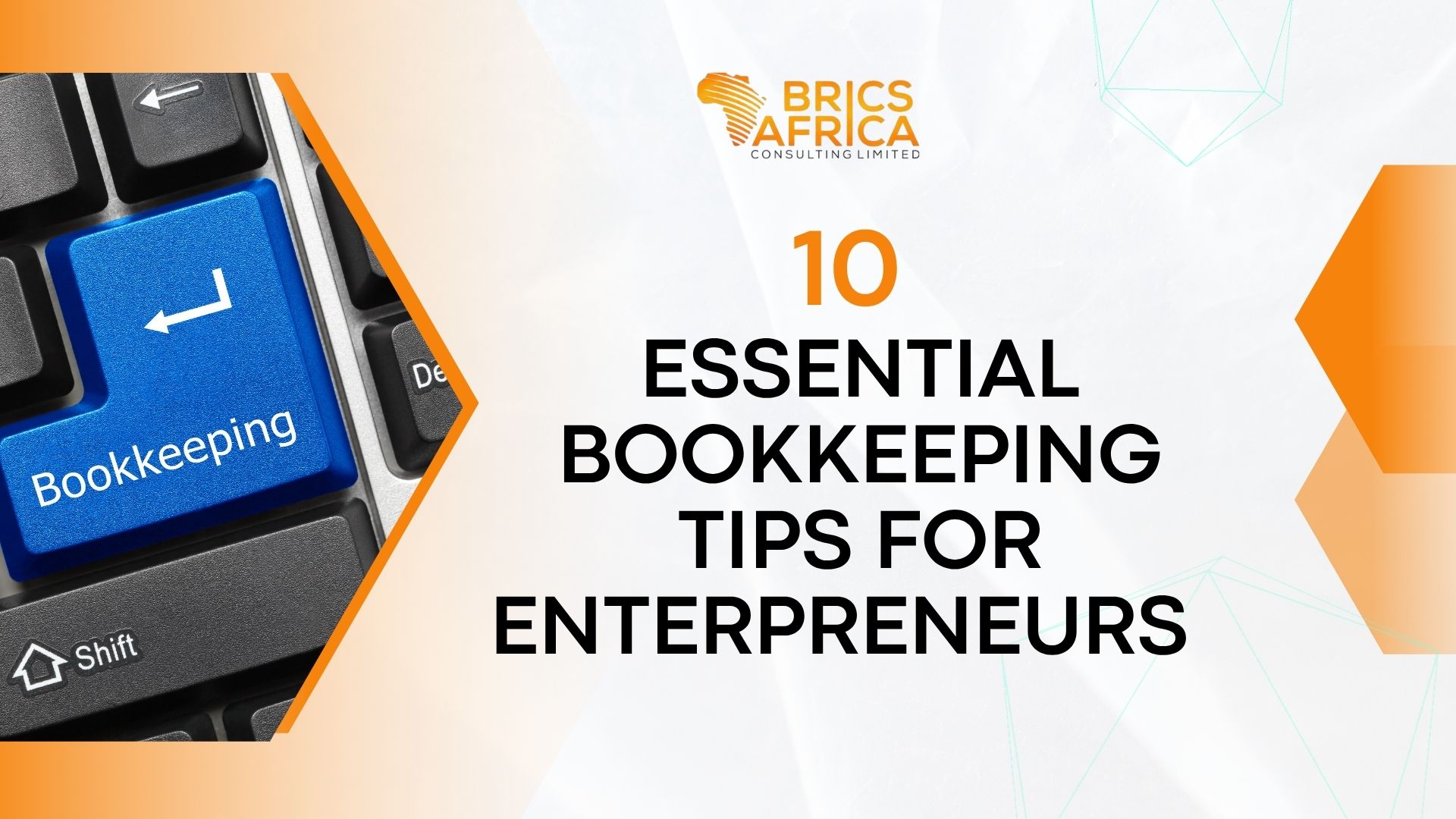Running a business is no small feat. From managing operations to ensuring happy customers, entrepreneurs have their hands full. But amidst the hustle and bustle, one thing you should never overlook is bookkeeping. Proper bookkeeping helps you keep track of your finances, make smarter decisions, and ultimately grow your business.
As Paul Mawuli will say, “What gets measured, gets managed.” Bookkeeping allows you to measure where your money is going and where it’s coming from. According to research, businesses with good financial management are 30% more likely to succeed than those without it.
If you’re an entrepreneur who feels lost when it comes to bookkeeping, don’t worry. We’ve got you covered with these 10 essential tips to keep your financial records organized and stress-free.
1. Keep Personal and Business Finances Separate
One of the first rules of good bookkeeping is to separate your personal and business expenses. It may seem easier to use one account for everything, but this can create big problems later.
Why does it matter?
- Mixing expenses makes it harder to track your profits.
- You may miss tax deductions because the lines get blurry.
- It’s difficult to prove business expenses during an audit.
Tip: Open a dedicated business bank account and use it for all your transactions. This simple step will save you hours of stress and confusion.
Did you know? Entrepreneurs who separate their accounts are 70% less likely to face financial mismanagement issues.
2. Track Every Expense
Small expenses add up. Whether it’s paying for office supplies, transportation, or software subscriptions, keeping track of every penny spent is vital for accurate records.
Here’s how to do it:
- Save all receipts and invoices.
- Use a bookkeeping software to record expenses in real-time.
- Categorize expenses (e.g., rent, supplies, utilities) for better reporting.
“Look after the pennies, and the pounds will look after themselves.” – British Proverb
Tip: Use mobile apps like Wave or QuickBooks to snap pictures of receipts. This makes it easy to store and organize your expenses.
3. Automate Where Possible
We live in a digital world, and automation can save you countless hours. Bookkeeping software can handle invoicing, expense tracking, payroll, and even financial reports with minimal effort.
Benefits of automation:
- Reduces human error.
- Saves time and money.
- Gives you real-time access to financial data.
Popular tools include Xero, FreshBooks, and QuickBooks. By automating routine tasks, you can focus on what matters most, growing your business.
According to research, businesses that use automated financial tools save up to 15 hours a week on administrative tasks
4. Set Aside Time for Bookkeeping
Bookkeeping isn’t something you can push aside until the end of the month (or year!). When left unattended, records pile up and mistakes happen.
Tip: Schedule a regular “bookkeeping day,” whether it’s weekly or bi-weekly. Use this time to:
- Record income and expenses.
- Check outstanding invoices.
- Update financial records.
This works because consistency keeps your finances in order and reduces stress at tax time.
5. Plan for Taxes Early
Taxes can be overwhelming, but planning ahead can make the process painless. By staying organized, you’ll avoid penalties and ensure you take advantage of all deductions.
Steps to prepare for taxes:
- Save a portion of your earnings for taxes.
- Keep all tax-related receipts and records.
- Consult a tax professional for advice.
Did you know? Businesses that plan ahead for taxes save 20% more on penalties and late fees.
6. Monitor Cash Flow Regularly
Cash flow is the lifeblood of any business. Without enough cash on hand, you can’t pay bills, suppliers, or employees.
How to monitor cash flow:
- Create a cash flow statement every month.
- Track incoming and outgoing money.
- Identify areas where you can cut costs or boost revenue.
“Happiness is a positive cash flow.” – Andy Osei Ameyaw, Financial Analyst
Tip: Use software to get a visual overview of your cash flow. Knowing your financial position helps you make informed decisions.
7. Create and Send Invoices Promptly
Delayed invoices lead to delayed payments, which can hurt your cash flow. Make it a habit to send invoices as soon as you deliver goods or services.
How to streamline invoicing:
- Use invoicing software to automate the process.
- Set clear payment terms (e.g., “Net 15” or “Net 30”).
- Follow up on overdue payments with polite reminders.
Did you know? Businesses that send invoices promptly are paid 2x faster than those that delay.
8. Reconcile Your Accounts
Reconciliation is the process of matching your financial records with your bank statements. It ensures that everything adds up and uncovers any errors.
Why is it important?:
- Detects missing transactions or fraud.
- Helps you catch bank errors.
- Keep your records accurate for reporting.
Tip: Reconcile your accounts at least once a month to stay on top of your finances.
9. Understand Financial Reports
Financial reports provide insights into the health of your business. At the very least, you should understand:
- Profit and Loss Statement: Shows your revenue, expenses, and profit.
- Balance Sheet: Shows your assets, liabilities, and equity.
- Cash Flow Statement: Tracks money coming in and going out.
These reports help you make better business decisions and identify areas for improvement.
If you struggle to read financial reports, Brics Africa Consulting can help. Our experts can break down the numbers and show you exactly what they mean for your business.
10. Seek Professional Help
As your business grows, managing your books becomes more complex and time-consuming. While it might seem cost-effective to handle everything yourself, professional bookkeepers bring expertise that can save you both time and money in the long run.
Why hire a professional bookkeeper?
- Accuracy and Compliance: Professionals ensure your records are error-free and comply with all regulations, reducing the risk of penalties or fines.
- Time-Saving: Outsourcing bookkeeping frees up your time, allowing you to focus on core business activities like strategy, sales, and growth.
- Financial Insights: Experienced professionals provide valuable financial reports and insights that help you make informed decisions for your business.
- Tax Planning: Professional bookkeepers work closely with accountants to ensure your taxes are filed correctly, and you take advantage of all eligible deductions.
Did you know? According to research, businesses that outsource bookkeeping services report greater efficiency and reduced financial stress.
At Brics Africa Consulting, we provide tailored bookkeeping solutions to fit your business needs. Our team ensures your records are organized, accurate, and ready for audits or tax season. Whether you need monthly bookkeeping, financial advisory services, or help interpreting financial reports, we’re here to support your growth journey.
Partnering with professionals doesn’t just mean staying organized, it’s an investment in your success.
Take Control of Your Business Finances Today
Bookkeeping may not be the most exciting part of running a business, but it’s one of the most important. By following these 10 essential tips, you’ll set your business up for financial success.
Remember, you don’t have to do it alone. At Brics Africa Consulting, we provide professional bookkeeping, financial management, and business advisory services to help you stay on track.
✨ Ready to take charge of your finances?
Contact us today:
- 📞 Phone: 0542926819 | 0530551562
- 🌐 Website: bricsafricaconsulting.com
- 📧 Email: info@bricsafricaconsulting.com
- 📲 Follow Us: @bricsafrica on all social platforms.
Let us help you make informed financial decisions that drive results and deliver sustained value. Your business deserves nothing less!








